With this cool Leaf Chromatography science experiment, kids can see the different pigments found in leaves and answer the question, “Why do leaves change color?” Download a free printable leaf color chart too.
I think all kids are fascinated with the natural change of leafy, green, summer leaves, to orange, yellow, and brown fall leaves. When the leaves start to change we always gather as many different colored leaves as we can. After extracting chlorophyll with our Easy Fall Leaf Science Experiment and using markers to create Fall Leaf Absorption Art we decided to see if we could get the pigments in the leaves to separate through chromatography so we could take a closer look at the colors found inside leaves. Watch the kids do the whole LEAF CHROMOTAGRPHY EXPERIMENT on YouTube so your kids can do it too.
Thank you for visiting. This post may contain affiliate links to recommended products at no extra cost to you. Read our Disclosures and Terms of Use. Don't miss out again, become a Reader here <--it's FREE.
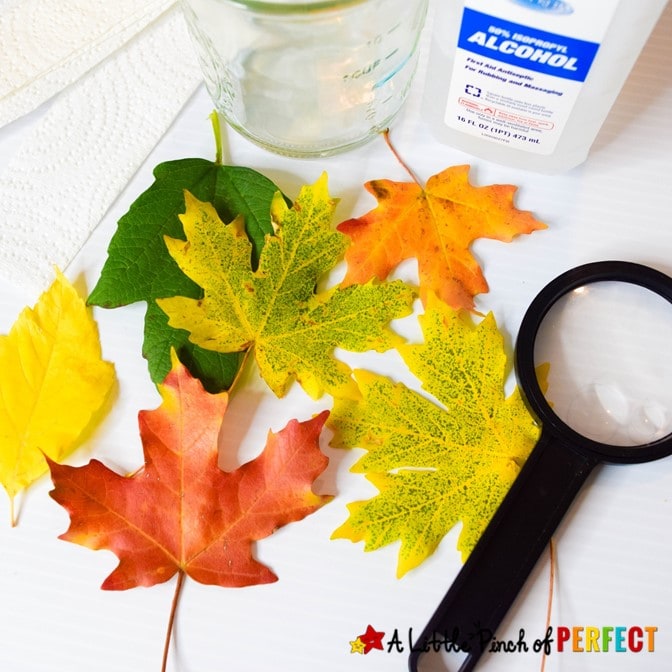
Chromatography is “a laboratory technique for the separation of a mixture. The mixture is dissolved in a fluid called the mobile phase, which carries it through a structure holding another material called the stationary phase. The various constituents of the mixture travel at different speeds, causing them to separate.” Wikipedia

The different colors found in leaves are created by different chemicals. I created this handy chart to list the different chemicals and what colors they create in leaves. Green is from chlorophyll, yellow is from flavonoids, orange is from carotenoids, and red is from anthocyanins . You can DOWNLOAD and print the chart or pin to reference back to it later.
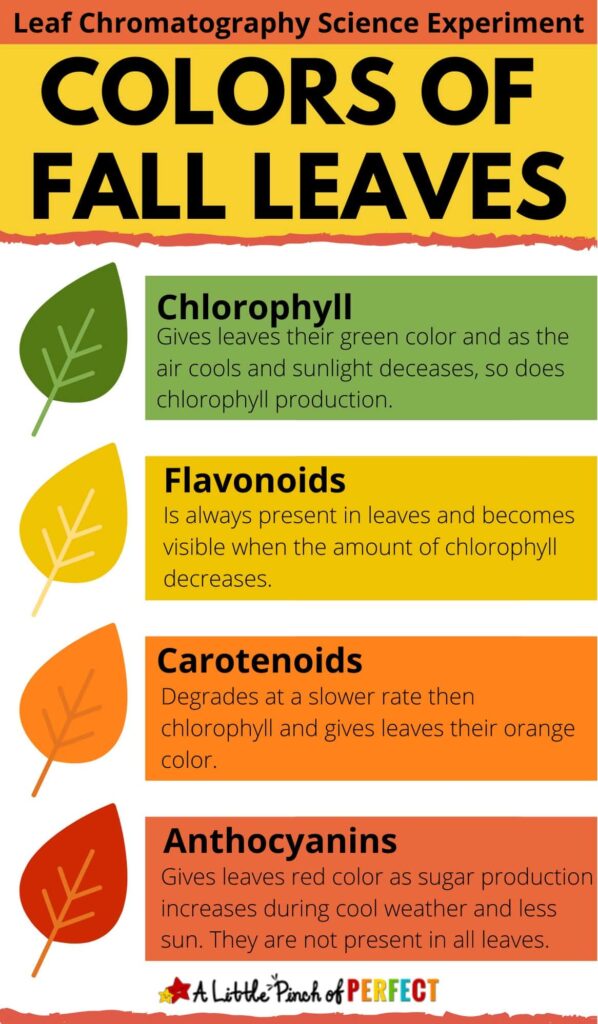
Don’t see the box? CLICK HERE to be directed to the download. Please share and pin our printable ? While you are here, take a look at more of our Free Printables.
SUGGESTED BOOKS & ACTIVITIES:
Click photos: Affiliate links to more information on these books we love! (Purchases through affiliate links earn us a small commission with no extra cost to you. See our Disclosure Policy here.)
Trees, Leaves & Bark (Take Along Guides) Goodbye Summer, Hello Autumn
Goodbye Summer, Hello Autumn Trees, Leaves, Flowers and Seeds: A Visual Encyclopedia of the Plant Kingdom (Smithsonian)
Trees, Leaves, Flowers and Seeds: A Visual Encyclopedia of the Plant Kingdom (Smithsonian) Leaf Wooden Jigsaw Puzzles Educational Learning Stem Toys Boys Girls Birthday Gift Colorful Shape
Leaf Wooden Jigsaw Puzzles Educational Learning Stem Toys Boys Girls Birthday Gift Colorful Shape SUPLA Fall Tree of Thanks Craft Kit Felt Fall Tree Board with 52 pcs Detachable Autumn Leaf Ornaments Autumn Bulletin Board for Kids Classroom Craft Thanksgiving Activity
SUPLA Fall Tree of Thanks Craft Kit Felt Fall Tree Board with 52 pcs Detachable Autumn Leaf Ornaments Autumn Bulletin Board for Kids Classroom Craft Thanksgiving Activity Wooden leaf fall Lacing Toy Game set Learning toy Threading set
Wooden leaf fall Lacing Toy Game set Learning toy Threading set
Leaf Chromatography Science Experiment
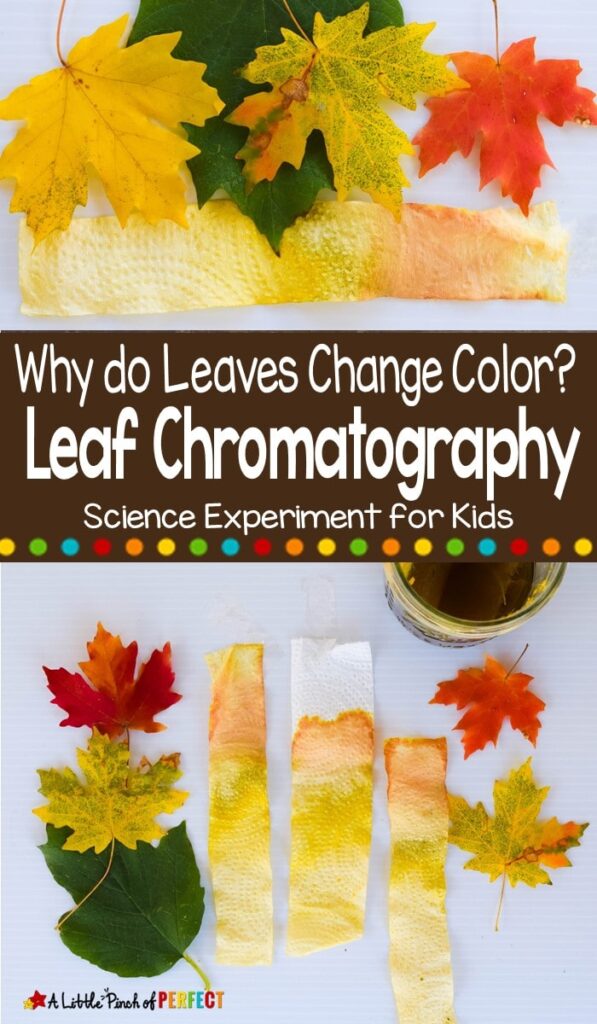
SUPPLIES:
- Rubbing Alcohol-affiliate link

- Blender (I used our little Immersion Hand Blender-affiliate link
 )
) - Glass Jar
- Safety Goggles-affiliate link
 (optional)
(optional) - 1 inch thick and 9 inches long-strips of paper towel
- Leaves (Having leaves with lots of different colors is really fun but you could also use just green leaves and look at the different shades of green from the chlorophyll)
- Tape (optional)
DIRECTIONS:
Watch our short tutorial video below.
Grab the kids and watch our FULL TUTORIAL on YOUTUBE HERE so you can do the experiment with us.
You can print the directions at the end of this post to make science time easy.
Gather leaves from outside. Make sure they are leaves you can touch safely. If possible, gather leaves that are different colors.
Break the leaves up into tiny pieces and put them into a jar. Try to leave the stems out, but if some get in the jar it is no big deal.
Option: We put different colored leaves all together in one jar. If you have several leaves of the same color you could keep them separate and use one jar per color (Red leaves in one jar, yellow leaves in a second jar… and so forth) You would just need to repeat the experiment for each jar.
Use the blender to break up the leaves more.
Carefully pour the rubbing alcohol into the jar so the leaves are covered.
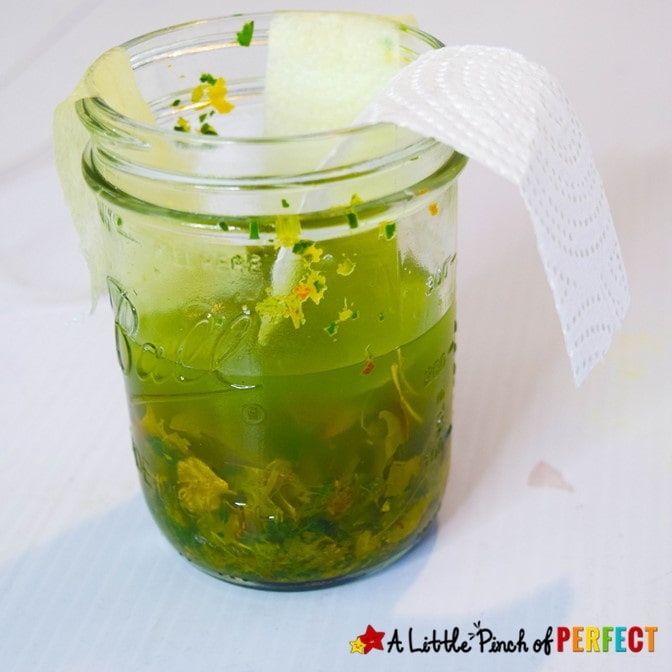
Fold the paper towel at the top so it can hang over the top of the jar. You can cut off the excess paper towel. We used a piece of tape to secure the paper towel so it wouldn’t fall into the jar. You want the paper towel to be in a vertical position. Let is sit undisturbed. We left ours overnight, however the experiment is done when the paper towel is dry.

Observe the strips of paper towel. Did the pigments separate? What colors do you see? Are some parts lighter and some parts darker? Refer back to the chart to talk about your findings and what types of chemicals can be found on your paper towel from the leaves.
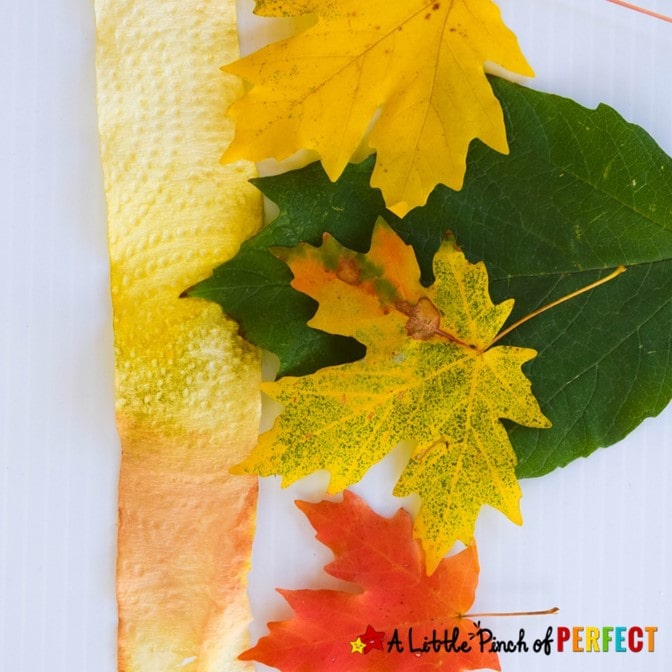
PRINT THE DIRECTIONS:
Leaf Chromatography Science Experiment for Kids
Materials
- Rubbing Alcohol-affiliate link
- Blender (I used our little Immersion Hand Blender-affiliate link)
- Glass Jar
- Safety Goggles-affiliate link (optional)
- 1 inch thick and 9 inches long-strips of paper towel
- Leaves (Having leaves with lots of different colors is really fun but you could also use just green leaves and look at the different shades of green from the chlorophyll)
- Tape (optional)
Instructions
- Gather leaves from outside. Make sure they are leaves you can touch safely. If possible, gather leaves that are different colors.Break the leaves up into tiny pieces and put them into a jar. Leave the stems out. Option: We put different colored leaves all together in one jar. If you have several leaves of the same color you could keep them separate and use one jar per color (Red leaves in one jar, yellow leaves in a second jar… and so forth) You would just need to repeat the experiment for each jar.Use the blender to break up the leaves more. Carefully pour the rubbing alcohol into the jar so the leaves are covered. Fold the paper towel at the top so it can hang over the top of the jar. We used a piece of tape to secure the paper towel so it wouldn't fall into the jar. You want the paper towel to be in a vertical position. Let is sit undisturbed. We left ours overnight, however the experiment is done when the paper towel is dry. Observe the strips of paper towel. Did the pigments separate? What colors do you see? Are some parts lighter and some parts darker? Refer back to the chart to talk about your findings and what types of chemicals can be found on your paper towel from the leaves.
ADD TO THE FUN WITH THESE IDEAS:
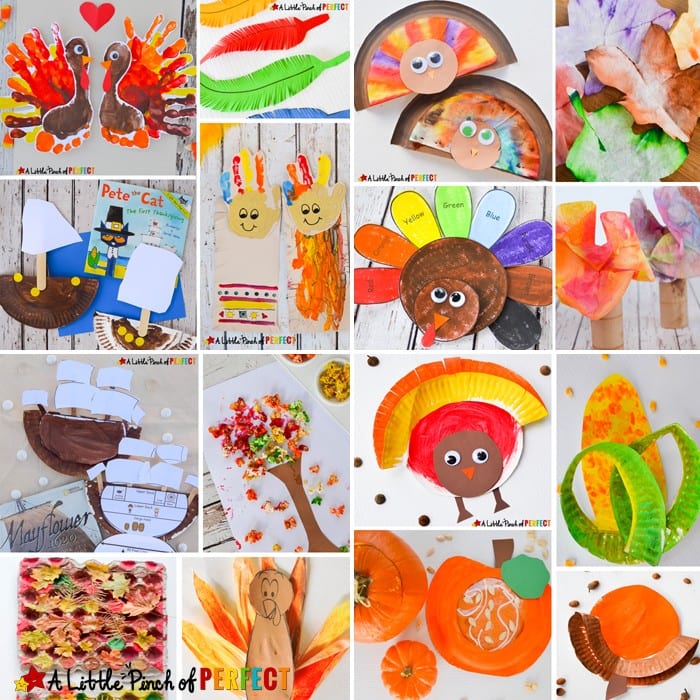
Fall Crafts
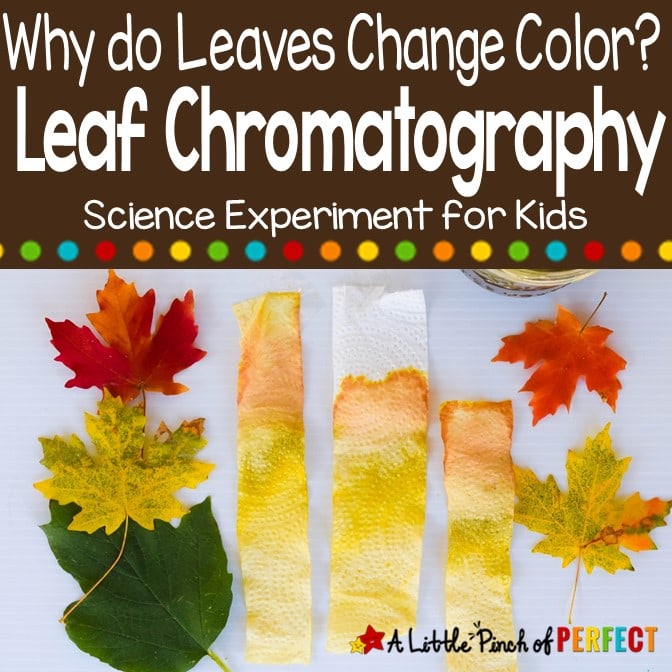





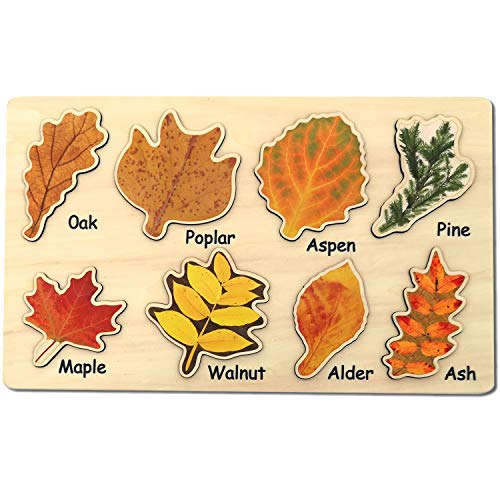
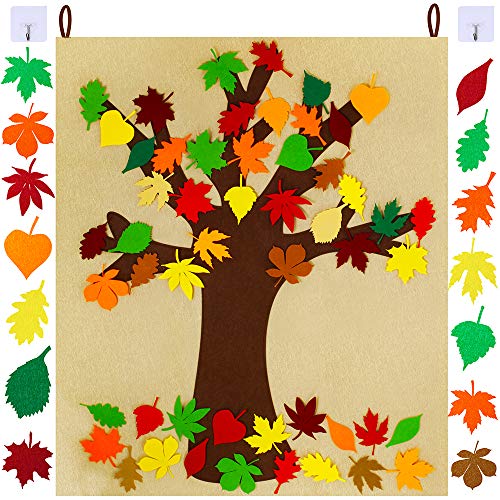
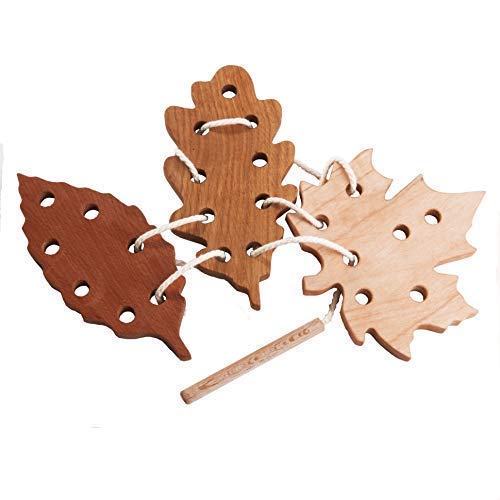
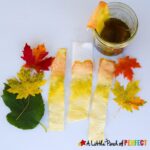
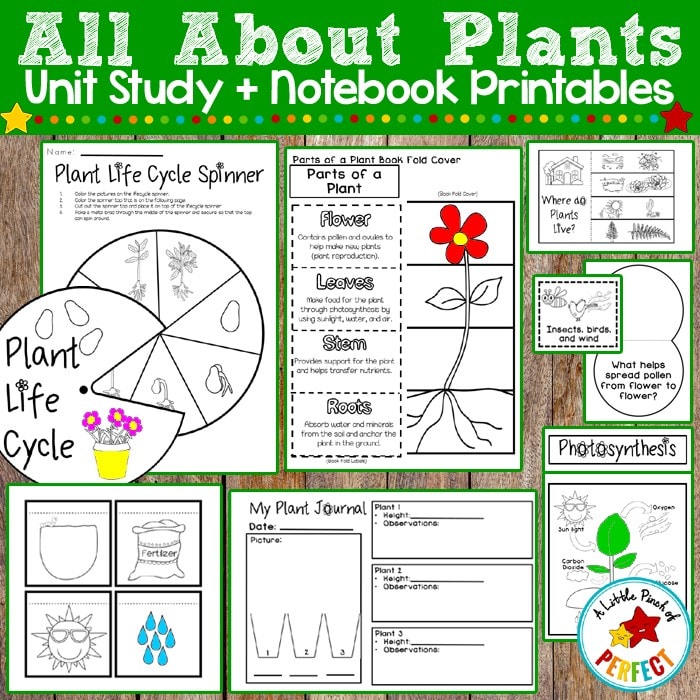
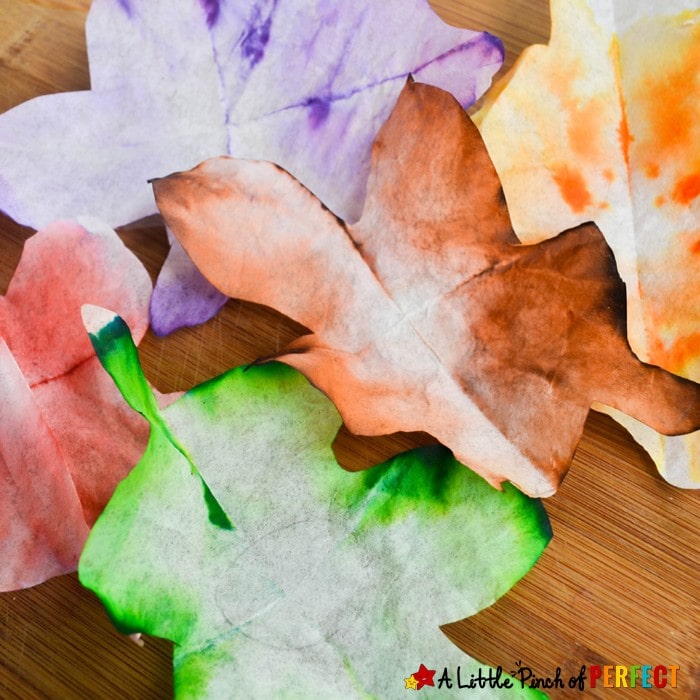
Extract pigments from autumn leaves? What a creative idea!